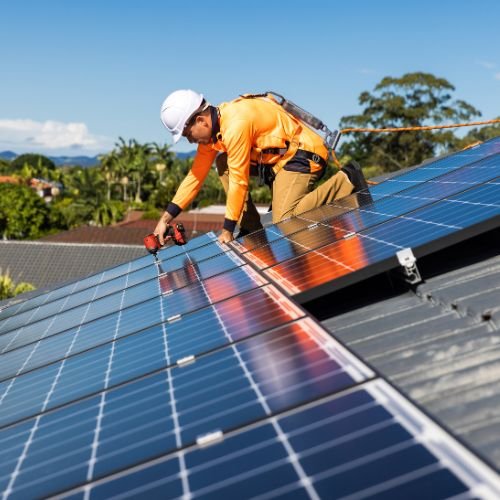Solar with Energy Storage
Solar energy paired with energy storage systems presents a formidable duo in the quest for sustainable and reliable power generation. This combination addresses some of the key challenges of solar energy, such as intermittency and variability, by providing a means to store excess energy generated during periods of high sunlight for use during times when sunlight is unavailable or insufficient.
Here’s an exploration of this dynamic duo:
- Solar Energy Generation:
Solar power harnesses energy from the sun through photovoltaic (PV) panels or concentrating solar power (CSP) systems. PV panels directly convert sunlight into electricity using semiconductor materials, while CSP systems use mirrors or lenses to concentrate sunlight onto a small area, generating heat to produce steam that drives a turbine and generates electricity. - Energy Storage Systems: Energy storage systems store surplus energy generated during periods of high solar irradiance for later use. Common energy storage technologies include batteries, pumped hydroelectric storage, thermal energy storage, and hydrogen storage. Among these, batteries, especially lithium-ion batteries, are increasingly popular due to their high efficiency, scalability, and decreasing costs.
- Advantages of Solar with Energy Storage:
- Grid Stability: Energy storage helps smooth out fluctuations in solar energy production, enhancing grid stability and reliability.
- Energy Independence: Pairing solar with storage reduces dependence on the grid, especially in remote areas or during grid outages.
- Maximized Solar Utilization: Excess solar energy generated during peak sunlight hours can be stored and used during periods of low or no sunlight, maximizing solar utilization and reducing wastage.
- Peak Shaving: Energy storage systems can be used for peak shaving, reducing electricity costs by drawing stored energy during periods of high demand when electricity prices are typically higher.
- Backup Power: Energy storage systems provide backup power during grid outages, ensuring uninterrupted electricity supply.
4. Applications:
- Residential: Solar with energy storage is increasingly adopted by homeowners to reduce electricity bills, enhance energy resilience, and lower carbon footprints.
- Commercial and Industrial: Businesses utilize solar with storage to reduce operating costs, improve energy reliability, and demonstrate commitment to sustainability.
- Utility-Scale: Large-scale solar farms with integrated energy storage contribute to grid stability, support renewable energy integration, and enable utilities to meet clean energy targets.
- Off-Grid Systems: Solar with energy storage is indispensable in off-grid applications such as remote communities, islands, and mobile or temporary installations like disaster relief efforts.


